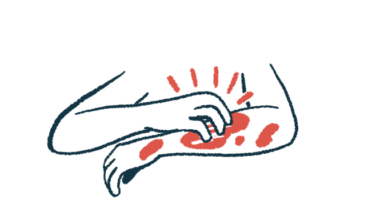TWI Biotech Launching Phase 2 Trial to Test AC-203 Diacerein Ointment in EB Patients

AC-203, also known as CCP-020, is advancing to a Phase 2 clinical trial as a potential treatment for patients with inherited epidermolysis bullosa (EB), TWi Biotechnology announced.
The proof-of-concept trial, which was approved by the Taiwan Food and Drug Administration, is designed to provide data on the treatment’s ability to reduce skin lesions in EB patients ages 2 or older. The company anticipates enrolling the first patient in April.
“While our partner for the territories outside of Asia, Castle Creek Pharmaceuticals (CCP), is conducting the global pivotal Phase 2/3 DELIVERS clinical trial for the treatment of epidermolysis bullosa simplex (EBS) using AC-203, we would like to evaluate the safety and efficacy of AC-203 in other types of EB,” Calvin C. Chen, PhD, president and CEO of TWi Biotech, said in a press release.
“The approval of the trial can enroll very young patients, 2 year old, is very important, because the younger the age of patients, the disease symptoms are more severe, and the risks of patient developing chronic complications and even death are higher,” he said.
AC-203 is a topical ointment of diacerin 1 percent, which has the potential to inhibit caspase-1 (CASP1) and interleukin-1 (IL-1) beta — two factors that contribute to inflammation in EB. Blocking these proteins may decrease inflammation, helping to strengthen the epidermal tissue and support skin healing.
According to DEBRA International, a global EB patient group organization, although the dystrophic type of EB affects only 25 percent of patients and the junctional type just 5 percent, their symptoms are more severe than the more common EB simplex (EBS), which affects about 70 percent of patients. With no approved therapies, AC-203 may represent hope for these smaller patients groups who have a very poor prognosis.
“An effective treatment in reducing lesion would be wonderful for people affected by the disease not only in physical but also in mental and moral,” said Se-Meng Cheng, founder and managing director of DEBRA Taiwan, who also is the mother of a junctional EB patient. “We are looking forward to working with TWi Biotech and doctors in the finding of effective treatments of EB for all the patients and their caregivers in the world.”
Data from an Austrian Phase 2/3 trial in EBS patients showed that four weeks of treatment with the ointment reduced blistering by 60%.
Castle Creek Pharmaceuticals is recruiting EBS patients 4 years and older for the DELIVERS trial (NCT03154333). The Phase 2/3 trial is expected to enroll 80 patients across the United States, Europe, Israel, and Australia. Researchers will evaluate the safety and effectiveness of CCP-020 taken once a day for eight weeks, compared with placebo.






